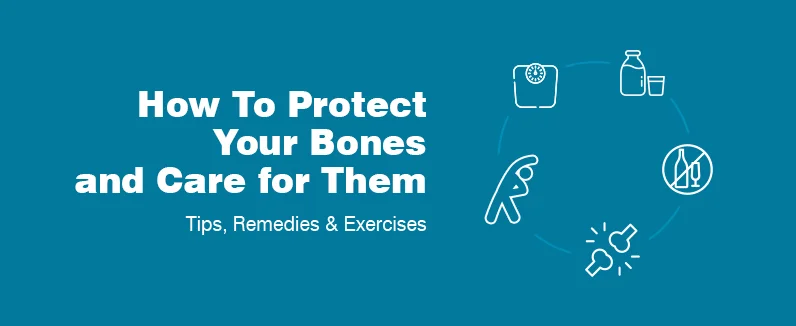How to protect your bones and care for them: Tips, Remedies & Exercises
Bones are a significant component of the body which provide a structural framework to the body, protect internal organs from injury and assist in movement. However, bones are at a constant risk for wear and tear due to a number of causes including age, diseases, deficiencies, traumas, and injuries. Osteoporosis is a disease in which bones deteriorate or become brittle and fragile, which increases the risk of a broken bone. Osteoporosis symptoms are not widely known.
Because of the key functions played by the bones in your body, it makes it important to protect your bones and prevent them from diseases, including osteoporosis, osteoporosis causes the bones to become weak and brittle. Fortunately, a number of lifestyle habits and dietary modifications can help you build strong bones and maintain them as your age. Here are some ways to protect your bones and care for them.
- Get enough calcium.
Calcium is the most important mineral in the body which is mainly found in teeth and bones. It is a mineral that helps bones stay strong and maintains the bone mass necessary to support the skeleton. Eating a calcium-rich diet is crucial for maintaining a good bone health. Calcium-rich foods include- dairy products, soy milk, orange juice, salmon and vegetables such as spinach, kale and broccoli.
- Vitamin D
Vitamin D is an essential nutrient for bone health as it helps in the absorption of calcium, regulates the amount of calcium in the blood and strengthens the bones. It is also important for maintaining a healthy immune system and aids in healthy cell growth. The main source of vitamin D is exposure to sunlight. Some foods also have vitamin D is small amounts such as fatty fish like tuna, oranges, dairy products, soy milk, cheese, and egg yolks. In the case of vitamin D deficiency, the doctor may prescribe vitamin D supplements.
- Indulge in exercises for osteoporosis
The ideal exercise to maintain healthy bones includes weight-bearing exercises for the spine and hip. This may include brisk walking, running, climbing stairs and dancing. A 30 to 60-minute exercise regularly is beneficial not just for bone health, but for your cardiovascular health as well.
- Maintain a healthy weight
In addition to improving your diet and maintaining a healthy workout regime, maintaining a healthy weight is key to healthy bones. Having a body mass index under 21 is a risk factor for osteoporosis. On the other hand, being overweight can exert stress on the bones, and impair bone quality. Maintaining a stable and normal weight is your best bet when it comes to protecting your bone health.
- Regular bone check-up
Some people are at an increased risk of developing bone-related conditions such as those with a family history of bone disorders, aged people and those with conditions such as hyperthyroidism, cirrhosis of the liver and some chronic bowel disorders. If you know you may be at an increased risk, make bone-check-ups a part of your routine check-up to rule out any underlying conditions.
- Eat foods rich in Omega-3 fatty acids
Omega-3 fatty acids are well- known for their anti-inflammatory properties. They also protect against bone loss which is accompanied by the ageing process. Some good sources of omega-3 fatty acids include- fatty fish such as salmon, tuna; nuts and seeds such as flaxseed, chia seeds, walnuts etc.
- Limit alcohol, caffeine and salt intake
Cutting back on alcohol, and salt can protect your bones from any harm. Limit your alcohol consumption to no more than 2 drinks a day and caffeine to no more than 3 drinks a day. Caffeine and fizzy drinks reduce bone mass and therefore should be avoided.
Consuming unmonitored amounts of salt (sodium) can cause your body to lose calcium and can lead to bone loss. Limit your consumption of salt and highly salty food to prevent bone loss.

